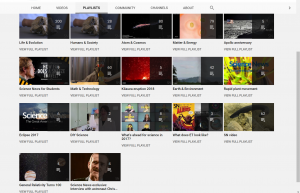Not Just Cat Videos?
Cat videos, fear pong, cooking 3 course meals with coffee makers; the black hole of random videos that feeds your horrible procrastination habit or as many refer to it as, YouTube. A platform where any content imaginable exists. Most use YouTube as a source of entertainment but among all the random videos there are educational channels such as “Crash Course” where I’m sure many of us have ended up watching the night before an exam.
Recently I have come across the channel, “Science News” that focuses on new topics and research in science. They have strategically organized their playlists into subcategories to allow the viewers to quickly scan and choose the topic they are interested in.

Science News Playlist Page
This channel has videos ranging from the math and physics to the biology and physiology side of the science spectrum. For example, they have posted a video teaching us about the mechanics of humpbacks whales and their use of their flippers in aiding them to catch fish more efficiently. And even if a specific science is not your forte, the videos are created so that very little background knowledge is needed to understand the content. The specific playlist that caught my eye was “Whats ahead for Science in 2017?“. This playlist exposed research in quick two to five minute videos giving a general summary of what research was being conducted at the time, and what topics future videos would be discussing.

Although this is from 2017 and they have not posted a playlist for 2018 or 2019, they continue to post videos on specific topics instead. While it is disappointing that they have not kept up with the looking ahead playlists, they are also actively promoting science through social media, specifically Twitter. They are constantly posting articles for example, they’ve recently shared an article by Sophie Bates about a new drug called olaparib that is used to repair the genes BRCA1 and BRCA2 which account for prostate cancer.
In this age of technology and social media, it is so easy to get enveloped in the noise of everything online. And while it is entertaining to get caught up in random videos, we are becoming less aware with what is going on around us. Channels and twitter feeds like Science News will become important for us to stay informed on what is going on in new research. So perhaps the next time you end up in a black hole of random YouTube videos some educational content will find its way to slip in there.
Monica Lee
